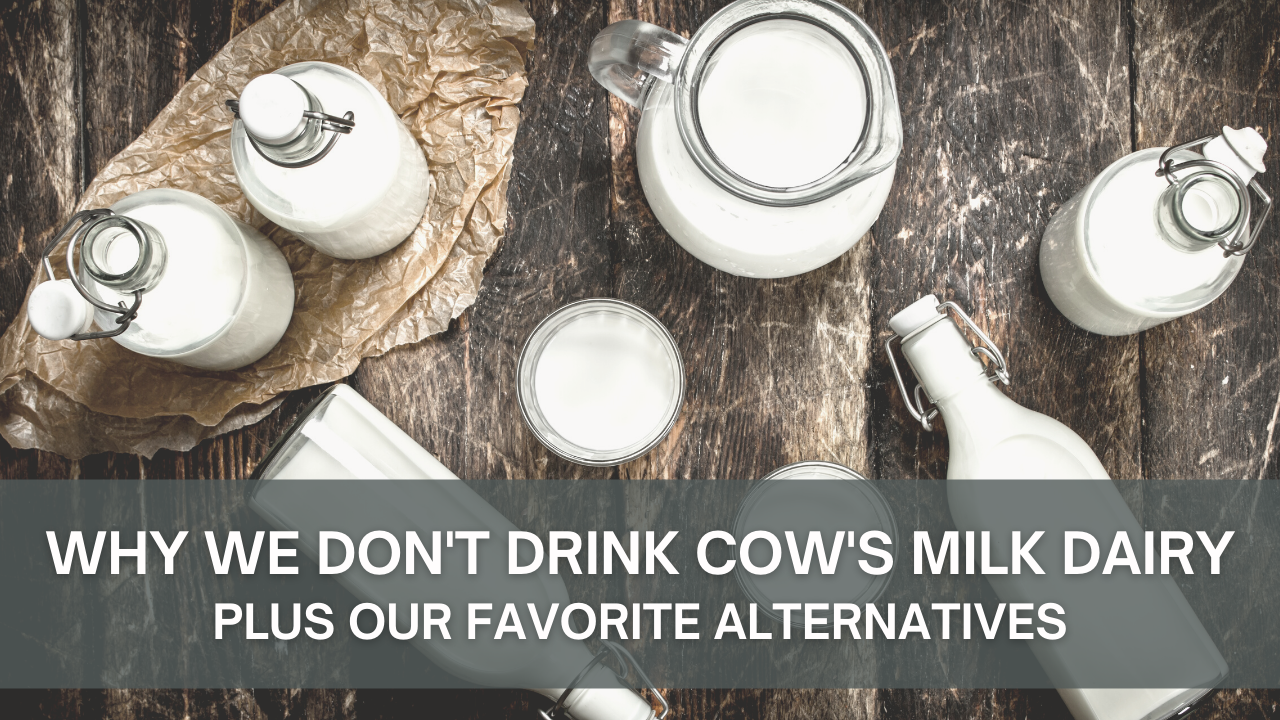Why we don't drink cow’s milk dairy + our favorite alternatives

The debate on whether milk is good or bad for you has become commonplace in the health industry. Milk, particularly cow's milk, has long been the frontrunner as the best source for not only calcium for strong teeth and bones but also the perfect carrier for fat-soluble micronutrients such as vitamins A, D, E, and K.
But are you a baby cow trying to grow into a big strong cow? I bet you aren’t. The truth is that all the benefits available in cow’s milk are also available from much healthier sources.
Now while we do not drink milk in our family, we are not promoting the theory that dairy is “bad for you.” We think instead that you should try to seek the best sources for your nutrients. As doctors but also as consumers, we consistently push for higher quality food supplies.
The Problem with Cow’s Milk
Statistically, most of the cow's milk and conventional dairy available in your supermarkets and grocery stores are produced from animals that are loaded with contaminants as a result of the way they were raised. Animals that are raised in mass production facilities often lack exercise, access to sunlight, and food that has not been treated with pesticides and other harmful products.
These cows are usually reared in overcrowded facilities and are often injected with growth hormones to produce a larger body mass and more milk. They are also given loads of antibiotics to stave off diseases that often arise from these overcrowded conditions.
There are two types of casein, the protein present in milk, A1 and A2. A1 casein is highly inflammatory and has been proven to increase inflammatory markers in the body. A2 casein is the only casein that is beneficial to our bodies and is quite often not present in milk produced by cows raised in this environment. Most conventional cow’s milk contains either a combination of A1 and A2, or only A1.
Our Choices for Dairy
As mentioned earlier, we do not drink cow’s milk, but this doesn’t mean we do not consume any dairy. Goat’s milk, sheep’s milk, and buffalo milk are not only super delicious, but also excellent sources of A2 casein. We also eat lots of yogurts, cheeses, and butter that have been made from these types of milk in their raw state.
Raw milk still has all the bio-available enzymes needed to break down the protein it contains, allowing for easier digestion. You’ll also find loads of beneficial bacteria in raw milk, which makes micronutrients like vitamins A, D, E, and K more bio-nutritionally available.
We like to use the unsweetened version of yogurt to which we add stevia, fruit, organic berries, nuts, and chia seeds for an amazing healthy addition to our meals. Redwood Hills and Old Chatham Farms are usually made from these sources and are available in most grocery stores.
Is Dairy Bad For You?
So is all dairy bad? Absolutely not. I am a big fan of Dr. Weston Price, a dentist whose travels all over the world proved that cultures that consume vast amounts of the fat-soluble vitamins A, D, E, and K had amazing teeth and the most fantastic jawlines.
Remember if you really love cow’s milk, be sure to source milk produced from animals that are casein A2, pasture-raised grass-fed animals. Check your labels for pasture-raised, grass-fed, grass-finished, non-GMO milk as its main source. Vital farms, local farmers, and Amish farmers are known to be providers of good quality milk.
But really, we think you may want to give goat, sheep, and buffalo raw milk a try. You’ll love how delicious it is! And it’s so much better for you.
